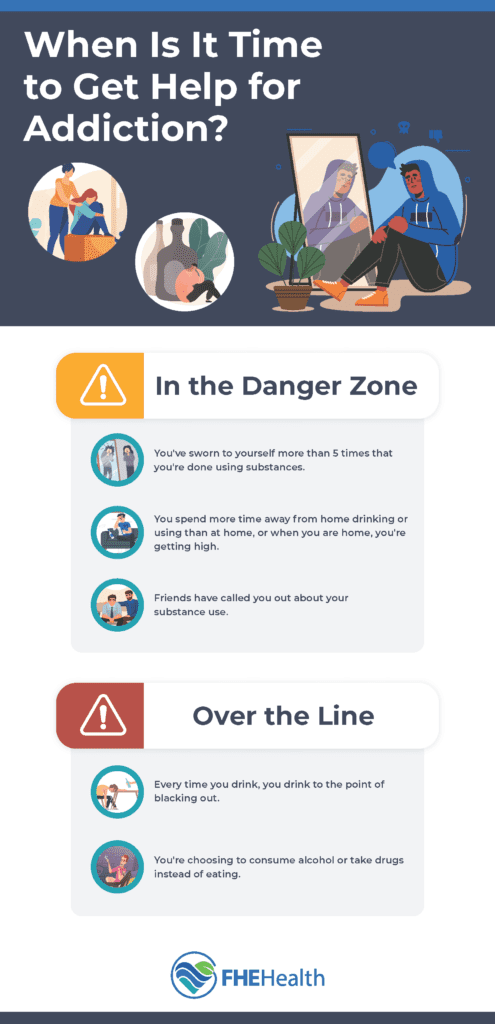
Life sometimes gets in the way of drinking and drug use, especially if the pattern of behavior is the direct cause of serious consequences. While it is difficult to know when to draw a line, for others or yourself, when the thought occurs that, “Maybe I need some rehab,” it could be a sign that it’s time to get help for an addiction.
It could be that you feel like you can control your drinking and drug use. Surely, it’s not a problem, right? But it might be a developing one, a situation that is getting worse and is harder to deny. Plus, it may be becoming too difficult to deal with alone. This is when someone might think, “Do I need to go to rehab? … Should I go to rehab?”
The following signs that it’s time to get help for addiction may help you discern an answer….
Signs It’s Time to Get Help
 Maybe the time isn’t right, personally. There’s too much going on at work, things are complicated but doable at home, and the skirmishes with the law haven’t resulted in jail time yet. But deep inside, the knowledge that something’s not okay begins gnawing away: “Maybe I need some rehab.”
Maybe the time isn’t right, personally. There’s too much going on at work, things are complicated but doable at home, and the skirmishes with the law haven’t resulted in jail time yet. But deep inside, the knowledge that something’s not okay begins gnawing away: “Maybe I need some rehab.”
1. Life Is All About Addiction
Using alcohol and drugs consumes everyday activity. Instead of tending to responsibilities at work and home, everything is all about the next time to drink or use, how to get the substance, how good it will feel to get high, and how to avoid discovery by family, friends, co-workers, and others. Besides, it’s such a good time hanging out with friends drinking, and getting high, that nothing else matters. This is a clear sign that “maybe I need some rehab.”
2. Tried to Quit and Can’t
Before someone commits to getting help for addiction, they often try multiple times to quit on their own. But they can’t. Time after time their inability to stay away from alcohol and drugs makes them feel disappointed, angry, and convinced that it’s not meant to be. What happens when someone is so hooked on drinking and drugs is that their brains are hijacked to the point that they can’t just quit using. Their body is so used to the effects of the alcohol and drugs that trying to quit brings on withdrawal symptoms that are unpleasant at best, painful and debilitating at worst. Do I need to go to rehab to fix this? The likelihood of a successful rehab is better with professional alcohol and drug rehab, so, yes.
3. Experienced an Overdose
Mixing alcohol and drugs, like combining alcohol and cocaine, alcohol and heroin or fentanyl, and drinking and using methamphetamines, are high-risk behaviors that could result in an overdose. Some people die from overdoses, and overdose deaths from alcohol and drugs are climbing. When someone has experienced an overdose and gotten medical attention quickly enough to survive, this is not the time to question whether to go to rehab. It’s time to look into where, how, and when to get help.
4. Substance Use Causing Harm to Others
An extremely serious sign that maybe I need some rehab is when substance use results in harm to others. This may be a loved one, family member, friend, co-worker, neighbor, or someone else who’s in a vehicle driven by you while you’re intoxicated or high. There’s an accident and they’re injured, whether it’s a minor injury or one requiring hospitalization. Worse yet, someone dies due to your addiction. Now, it’s no longer do I need to go to rehab, but how fast can it happen?
Others can be harmed by someone’s addiction without it involving a vehicular accident. Bankrupting the family finances also causes harm to others, in this case, the family. Failure to protect loved ones and family members because of blackouts, incarceration, arrests, and loss of job and income, are other harm-producing situations. Violent physical abuse, verbal attacks, intimidation, harassment, and threats are other examples of how addiction and substance use can cause harm to others.
5. Constant Legal Problems
Getting pulled over for a DUI, having a driver’s license suspended or revoked, mounting legal fees, racking up fines, having to pay increased insurance premiums, getting into accidents— all these constant legal problems are a glaring red light signaling trouble and serious consideration of rehab. These legal problems, like all the other problems that may be occurring now, won’t go away on their own. In the same way, neither will addiction cease without outside professional help.
6. Frequent Blackouts
Passing out from excessive drinking and drug use is a serious concern, yet another sign that it’s time to get help for addiction. When blackouts happen more frequently, only professional detox and rehab can help in overcoming what’s likely a substance use disorder. If you don’t remember what you did, how you got here, and have no recollection of driving or doing things others say you did, say these words: “Maybe I need some rehab.” Then, get help.
7. Friend-tervention Didn’t Work
Friends want the best for you, so maybe they staged an intervention. Call it a “friend-tervention.” Maybe that didn’t work and you wouldn’t go to rehab. Think about the reasons why they want you to get help for your addiction. Could it be that the drinking and drug use they see you engage in has gotten far beyond out of hand and is in the serious consequences stage? Take their genuine concern to heart: “Maybe I need some rehab.”
8. Substituting Alcohol and Drugs for Food
Most people eat to live, while others live to eat. In the case of substance use that’s progressed to the point of substance abuse and addiction, users often substitute alcohol and drugs for food. They neglect their nutritional intake with resulting physical consequences. Some alcohol and drug users lack the money to pay for both their substance of choice and food, so they go for the most desired ones: alcohol and drugs.
9. Loss of Interest in What Matters Most
Addiction to alcohol and drugs robs people of paying attention to the people that matter most in their lives: loved ones and family members. Addiction also causes a profound loss of interest in hobbies, activities, and recreational or sports pursuits that once were pleasurable. This is a clear indication that professional help to overcome addiction is needed.
10. Health Problems Occur
Substance use typically coincides with the development of a wide array of health problems. Asthma worsens, difficulty breathing and swallowing may become prevalent, along with new or worsening insomnia. Rapid weight gain or loss, significant changes in appearance, the onset of migraines, and other physical conditions are common. Trying to self-medicate with prescription drugs and/or alcohol to cope with anxiety or depression only serves to compound the underlying mental health condition and can lead to addiction to those substances.
11. Intensifying Relationship Problems
When someone is addicted to alcohol and drugs, they tend to isolate themselves. As a result, their relationships begin to suffer, often to the point of being irreparable. If the frequency of arguments, fights, disagreements, and escalating family conflicts are occurring, this is due to the addictive substances causing you to make bad choices. The inability to control temper, listen, take constructive criticism in stride, and fully engage with others is a consequence of addiction. And, as addiction is referred to as a family disease, it’s more than you who suffers. Everyone in the family is affected by addiction.
12. High-Risk Behavior
While pursuing the next drink or securing drugs to achieve the desired high, users often don’t calculate the high risks they’re taking— or don’t care. Driving while drunk is one example of a high-risk behavior associated with addiction. Having unprotected sex while high, trading sex for drugs, and stealing to get money for drugs are others.
Do I Need Rehab?
Do any (or all) of these signs register concern? Here’s what to do: Find a trusted individual to speak with about this situation. This could be a loved one, a friend, a family member, a doctor, a member of the clergy, or a professional. Express the desire to do something about the addiction that’s wreaking havoc in your life. Be determined to follow through, because getting professional help is the only effective way to deal with addiction.
How to Get Help
Deciding to go to rehab doesn’t have to be complicated. Once I’ve determined that I show many of these signs of addiction, I have my answer. If the goal is to get clean and sober and live a life not enslaved to drug or alcohol addiction, the answer should be clear. The next step is figuring out where to get the best and most effective treatment possible.
At FHE Health, our experienced team of medical professionals may be able to help. Contact us now for a free consultation.






